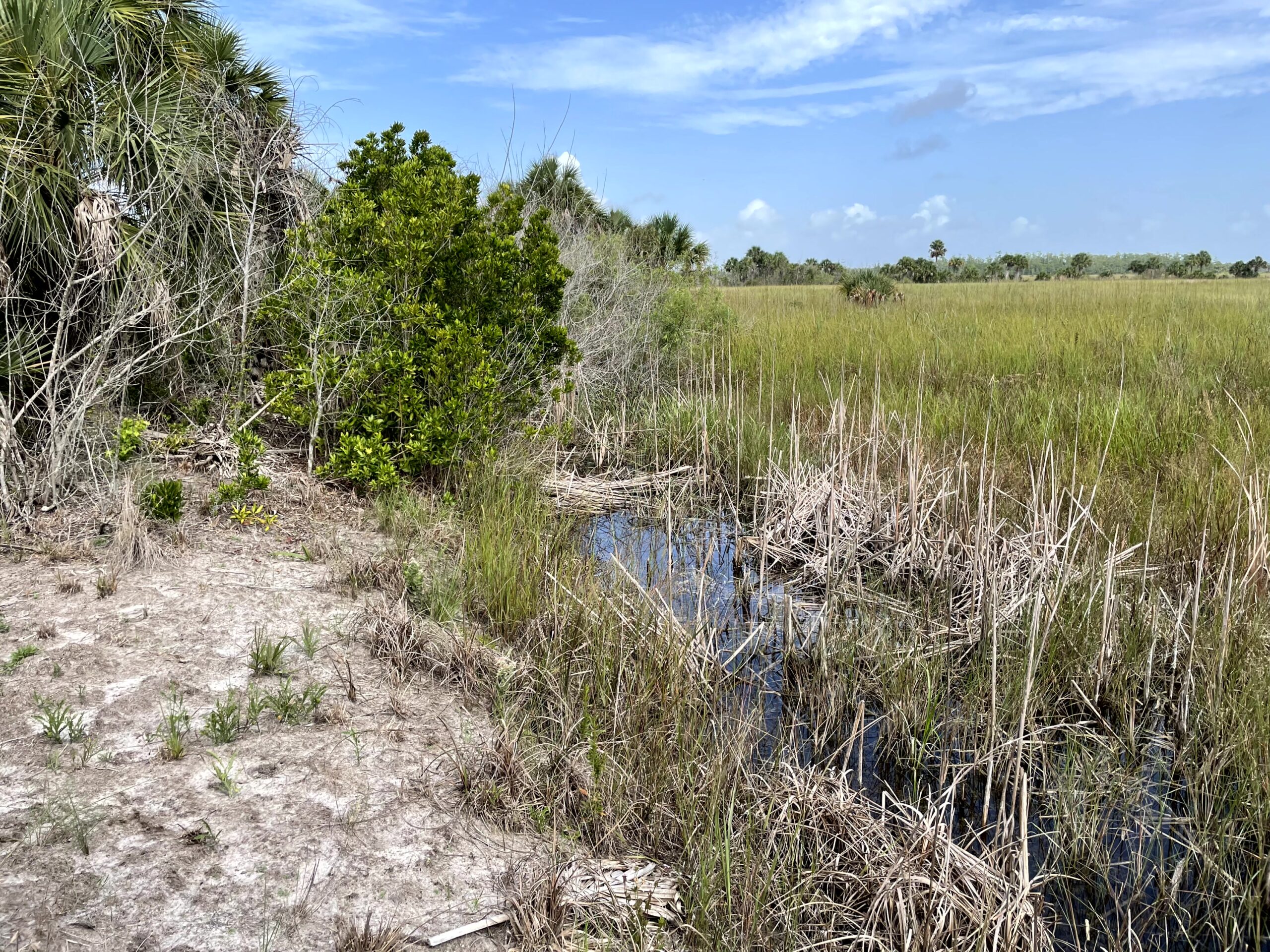It Was a Great Year for Salt Marsh Conservation Funding!
Several new or ongoing grants were secured to assist ACJV partner efforts to conserve land, implement restoration projects, and test promising management actions outlined in our conservation plans. For the third year in a row, we expect that every National Coastal Wetland Conservation Grant proposal submitted by ACJV partners will be funded! Millions of additional project dollars from competitive funding sources were raised by our many partners working throughout the Atlantic coast. Read more about ACJV-facilitated funding successes below.
National Fish and Wildlife Foundation (NFWF):
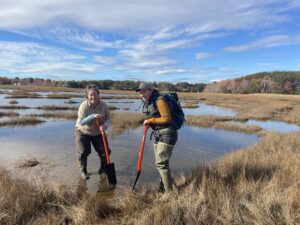
Biologists break ground on a salt marsh restoration project in Maine. Bri Benvenuti
National Coastal Resiliency Fund – The Delmarva Resource Conservation and Development Council received a $2.3M grant to support salt marsh restoration in Maryland’s Coastal Bays. The ACJV and the FWS Chesapeake Bay Field Office provided project coordination and ghost writing services. Funds will support Phase 1 implementation of 50 acres of restoration on private land and development of designs for an additional 969 acres of degraded salt marsh across four different privately held parcels. Work will address salt marsh loss and degradation through the use of runnels, ditch remediation, and sediment placement. This will include testing of an innovative idea to source sediment from upland farm fields, a more efficient and less costly source of sediment.
America the Beautiful – The ACJV and the FWS Science Applications Program helped to coordinate a multi-state proposal to NFWF’s America the Beautiful program focused on building climate resilience of salt marshes through practices that would restore marsh function and benefit at-risk species. Individual States submitted proposals under the NEAFWA Atlantic Coast Resiliency and Coastal Habitat Restoration initiative. Two of the three proposals that were submitted received funding – a $2M proposal from New Hampshire Department of Environmental Services and a $1M proposal from the Rhode Island Department of Environmental Management. Together, they will restore more than 1,000 acres of priority salt marsh habitat.
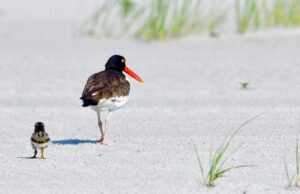
American Oystercatcher. Doris Rafaeli
Delaware Watershed Conservation Fund – The ACJV recently applied for and received funds to create a change analysis tool for vegetation communities in coastal marshes. We will work with partners to use this tool to model at-risk bird populations (Saltmarsh Sparrow, American Oystercatcher) within the Delaware Watershed as well as regionally (Maine to Virginia). These funds will also support significant monitoring work for saltmarsh sparrows on restoration sites in 2024.
Keystone Initiative
With funds from the Bipartisan Infrastructure Law and Inflation Reduction Act programs, the Department of the Interior is providing funding to restore healthy lands and waters and to address climate impacts through coordination across DOI agencies. One of the seven priorities of this Keystone funding is coastal salt marsh. In 2023, more than $900 thousand was provided to support five salt marsh restoration projects in the Maryland and Virginia Coastal Bays region. Funds will collectively restore 142 acres of degraded salt marsh at Chincoteague National Wildlife Refuge and on private lands.
North American Wetlands Conservation Act
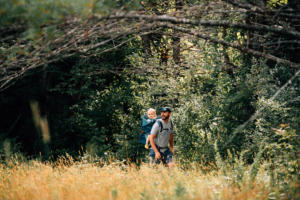
Family hiking on lands that connect to the Mill Hill Forest tract. Cait Bourgault
Starting in calendar year 2023, the NAWCA program raised the award limit for Standard Grants from $1 M to $3 M and raised the award limit for Small Grants from $100 K to $250 K. This facilitated larger NAWCA projects and created a more competitive environment for proposals. In the two rounds of NAWCA Standard grants submitted, seven and ten proposals were submitted, respectively, and six and five proposals were funded in the ACJV. Awarded grants totalled $23.3M, matched by $42.8M, and will conserve 28,105 acres. Eight NAWCA Small Grant proposals were submitted in 2023, and will be evaluated and awarded in the spring of 2024.
For a summary of recent projects click here:
NAWCA funding can support a wide variety of habitat protection and wetland enhancement, restoration, and creation projects. For example, recently-awarded NAWCA projects will:
- Protect habitat through fee title acquisition in Georgia, the Carolinas, Virginia, New York, and Maine;
- Place conservation easements on habitat in Virginia, New York, and Maine;
- Repair and enhance impounded wetlands in the Carolinas and New York;
- Enhance hydrology via water control structures in South Carolina, Virginia, and New York;
- Restore hydrology to a marl prairie in Florida by removing levees and filling ditches,
- Improve habitat conditions for waterfowl and fish by creating open water and controlling cattails in New York;
- Re-establish a rookery island in South Carolina;
- Restore the transition of wetland to grassland in a marsh in New York;
- Restore an agricultural field to historic natural communities in Florida;
- Remove invasive species in marshes in New York;
- Restore salt marsh in Maine using ditch plugs, ditch remediation, and creation of runnels; and
- Restore historic water flow adjacent to a canal system in New York.
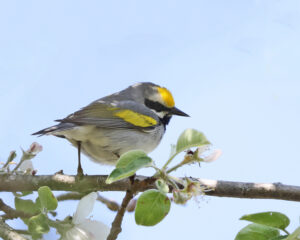
Golden-winged Warbler. Tom Murray, Creative Commons
Great Lakes Restoration Initiative
The Funding Opportunity Announcement (FOA) is now available for the Joint Venture portion of the Great Lakes Restoration Initiative (GLRI). The link is: www.acjv.org/documents/GLRI-JVFY24_NOFO.pdf
This competitive program will fund proposals that focus on habitat protection, restoration, or enhancement, for the conservation of native Great Lakes fish and wildlife populations, particularly migratory birds. Maximum award amount is $300K, and there is a 25% non-federal match requirement.
You may search for Opportunity Number F24AS00232 at GrantSolutions.gov or Grants.gov. You must apply through GrantSolutions.gov, (DO NOT apply through Grants.gov.)
Application packages are due on or before March 18th, 2024. Contact Mitch_Hartley@fws.gov if you have any questions about potential proposals and to confirm your application submission.
National Coastal Wetlands Conservation Grants
All four proposals for Coastal grants submitted from ACJV states in 2023 were funded. Nearly $3.4 M in grants (and $ 5.4 M in match) will conserve 1,037 acres in Maine, Massachusetts, North Carolina, and Florida.
View the projects here.

